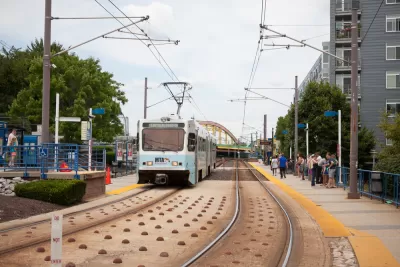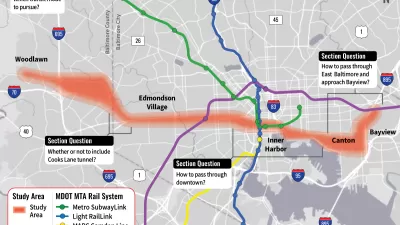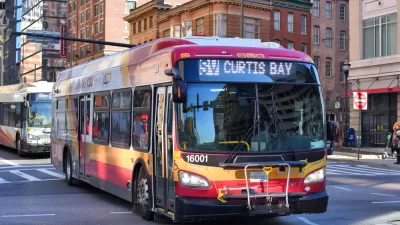Opposition to construction of rail transit based on concerns about crime is a familiar story to transit planners. Calling for existing transit stops to close is a little less familiar.

Lucia Graves reports from Glen Burie, Maryland, where Chris and Kim Hahn are leading an effort to reduce public transit service on the Maryland Transit Administration's Baltimore Light RailLink.
The Hahns had moved to the working/middle-class suburb seeking a quiet, safe environment away from the crime and strife of Baltimore, 10 miles away. But, like many in the neighbourhood, they say the city’s woes have seeped into the area via public transport. Specifically, they believe criminals are coming into the suburbs by light rail.
Graves reports that not only does the data not bear out the idea that transit has brought crime to the area, a specific anecdote of crime from the Hahns' history has no connection to public transit.
The calls from locals to close the Cromwell stop in Glen Burie prompted Maryland Governor Larry Hogan (not exactly a friend of rail transit himself) to announce that the state would not close any light rail stops.
"However, organisers from the recently founded Greater FernGlen Community Association, which rallies against the service to light rail stops in northern Anne Arundel county, were not deterred," reports Graves. Their persistence was on display when 60 residents showed up to a rally in July.
As detailed in an editorial by the Baltimore Sun, State Senate candidate John Grasso previously spread the anti-light rail animus by calling transit users "drug addicts, crooks, thieves." According to the editorial, the sentiment matches that of President Donald Trump, who launched his presidential campaign by calling Mexicans rapists.
FULL STORY: ‘Addicts, crooks, thieves’: the campaign to kill Baltimore's light rail

Maui's Vacation Rental Debate Turns Ugly
Verbal attacks, misinformation campaigns and fistfights plague a high-stakes debate to convert thousands of vacation rentals into long-term housing.

Planetizen Federal Action Tracker
A weekly monitor of how Trump’s orders and actions are impacting planners and planning in America.

In Urban Planning, AI Prompting Could be the New Design Thinking
Creativity has long been key to great urban design. What if we see AI as our new creative partner?

King County Supportive Housing Program Offers Hope for Unhoused Residents
The county is taking a ‘Housing First’ approach that prioritizes getting people into housing, then offering wraparound supportive services.

Researchers Use AI to Get Clearer Picture of US Housing
Analysts are using artificial intelligence to supercharge their research by allowing them to comb through data faster. Though these AI tools can be error prone, they save time and housing researchers are optimistic about the future.

Making Shared Micromobility More Inclusive
Cities and shared mobility system operators can do more to include people with disabilities in planning and operations, per a new report.
Urban Design for Planners 1: Software Tools
This six-course series explores essential urban design concepts using open source software and equips planners with the tools they need to participate fully in the urban design process.
Planning for Universal Design
Learn the tools for implementing Universal Design in planning regulations.
planning NEXT
Appalachian Highlands Housing Partners
Mpact (founded as Rail~Volution)
City of Camden Redevelopment Agency
City of Astoria
City of Portland
City of Laramie





























